
Benjamin Netanyahu has said all parts of Gaza will be under Israeli control by the end of the war and that Hamas will be defeated, in a signal that he will not back down on his controversial military escalation.
Speaking at a news conference tonight, the Israeli PM said he is prepared to end the war "under clear conditions that ensure Israel's security,” which would involve the release of all remaining hostages in Gaza.
The prime minister said 20 hostages seized by Hamas in the October 7, 2023 attacks are believed to be alive and up to 30 others have died.
While Netanyahu said he was open to a ceasefire deal, conditions for this would include Hamas laying down arms, its leadership being exiled from Gaza and the strip being "completely disarmed." Residents who want to leave Gaza will be able to leave, he added.
During his statement, the prime minister also stressed the need to prevent a humanitarian crisis and unveiled a three-stage plan to get aid deliveries into Gaza.
This plan includes the delivery of basic aid items into Gaza, opening food distribution points, and creating a zone to protect civilians after assuming security control of Gaza.
According to the Israeli military, 100 aid trucks carrying flour, baby food, and medical equipment entered the Gaza Strip on Wednesday.
However, UN officials said distribution problems had meant that no aid had so far reached people in need.
It comes as numerous aid agencies confirmed that 14,000 babies were at risk of dying from malnutrition if aid does not reach them in the next 48 hours.
The World Food Programme has said the movement of supplies was underway but that there had been no aid distribution yet.
Israel's military sent a late update that 100 trucks carrying flour, baby food and medical equipment had been transferred from Kerem Shalom crossing into Gaza.
Global experts have warned of an imminent famine in the territory.
"None of this aid - that is a very limited number of trucks - has reached the Gaza population," said Antoine Renard, country director of the World Food Programme (WFP).
A United Nations spokesperson said trucks were still in the loading area of Kerem Shalom, the sprawling logistics hub at the southeastern corner of the Gaza Strip, because access to the rest of Gaza was too insecure to allow safe distribution.
However, two merchants familiar with the matter said late on Wednesday that at least 15 aid trucks left the Kerem Shalom crossing en route to World Food Program warehouses in central Gaza.
The Israeli blockade has left Gazans in an increasingly desperate struggle for survival, despite growing international and domestic pressure on Israel's government, which one opposition figure said risked turning the country into a "pariah state".
"There is no flour, no food, no water," said Sabah Warsh Agha, a 67-year-old woman from the northern Gaza town of Beit Lahiya sheltering in a cluster of tents near to the beach in Gaza City.
"We used to get water from the pump, now the pump has stopped working. There is no diesel or gas."
Thousands of tons of food and other vital supplies are waiting near crossing points into Gaza but until it can be safely distributed, around a quarter of the population remains at risk of famine, Renard said.
Abdel-Nasser Al-Ajramy, the head of the bakery owners' society, said at least 25 bakeries that were told they would receive flour from the WFP had seen nothing and there was no relief for the hungry waiting for food.
"I'm here since eight in the morning, just to get one plate for six people while it is not enough for one person," said Mahmoud al-Haw, who waits in panicked crowds for up to six hours a day hoping for some lentil soup to keep his children alive.
Israel imposed the blockade in March, saying Hamas was seizing supplies meant for civilians - a charge the group denies.







